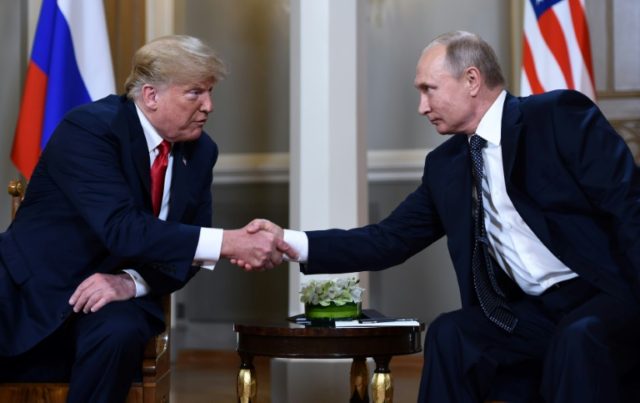The communist government of China formally praised President Donald Trump’s summit with his Russian counterpart, Vladimir Putin, on Tuesday, but the Global Times state newspaper addressed concerns that “the two global giants might form an alliance against China,” belying worries in Beijing.
During her regular press briefing Tuesday, Chinese Foreign Ministry spokesperson Hua Chunying told reporters that the Chinese communist regime has “paid much attention to this event,” referring to the summit, but did not add much detail as far as how Xi Jinping and his cohorts are responding to revelations at the summit.
“China welcomes the meeting between Putin and Trump – the leaders of powers greatly influencing the entire world,” Hua noted. “We hope that this political dialogue will positively affect the world and global development.”
Hua added that China is “confident” that, despite any thaw in relations between Washington and Moscow, China and Russia will continue to get along on the world stage.
China and Russia tend to support each other on the international stage, particularly at the U.N. Security Council, where they are both permanent members. They also tend to be accused in tandem of violating international law, whether it be the colonization of foreign territory (in the South China Sea or Ukraine), violation of international sanctions (in North Korea), or human rights violations within their borders. Both have a historically contentious relationship with America.
President Trump may have alarmed some in Beijing by mentioning China in a brief press availability before his private meeting with Putin. The president said the pair would discuss “everything from trade to military to missiles to nuclear [weapons] to China,” adding that Communist Party leader Xi Jinping was a “mutual friend.”
It remains unclear to what extent Trump and Putin discussed China or what they said, as reporters at the press conference following the summit did not ask. Instead, most of the press conference was dedicated to discussing allegations that Russian officials attempted to “hack” the 2016 election.
China has become a growing concern to Russia and its stagnant economy, thanks in large part to its One Belt, One Road (OBOR) program, a scheme to dominate the world’s largest and newest ports, roads, and railways. Central Asia’s post-Soviet states are key areas of development for OBOR, where China has sold Kazakhstan, Kyrgyzstan, and Uzbekistan, among others, the benefits of having a Chinese workforce invade the country and build advanced transportation systems – forever beholden to China. OBOR has become most controversial in Kenya, where workers complain of racist treatment by Chinese workers and Chinese government abuse and misuse of the nation’s immigration system.
Chinese control of the major transportation hubs in central Asia would essentially isolate Russia, a concern that may lead Moscow to pursue cooperation with Washington to contain Beijing. While Hua may not have publicly aired it, China’s concern about such a possibility appeared on the pages of the state-run Global Times Tuesday.
The Global Times cited its usual roster of government-approved “experts” to dismiss “previous reports that the two global giants [America and Russia] might form an alliance against China,” citing several examples in American media of outlets suggesting that China would keep a keen eye on Putin and Trump.
The experts cited did not disagree that Beijing had an interest in the summit but did not accept that it was a matter of worry.
“It is necessary for Putin and Trump to talk about China, because China is important,” a professor identified as Li Haidong is quoted as saying. “But it does not mean that Russia and the US are seeking ways to confront China.” Li identified China as simply a “more active and effective partner” than the United States.
Another expert suggested that Trump could not sway Putin away from China because he cannot do so since “the powers behind him” would prevent him from establishing warm relations with Russia. The expert did not specify to whom the term referred.

COMMENTS
Please let us know if you're having issues with commenting.